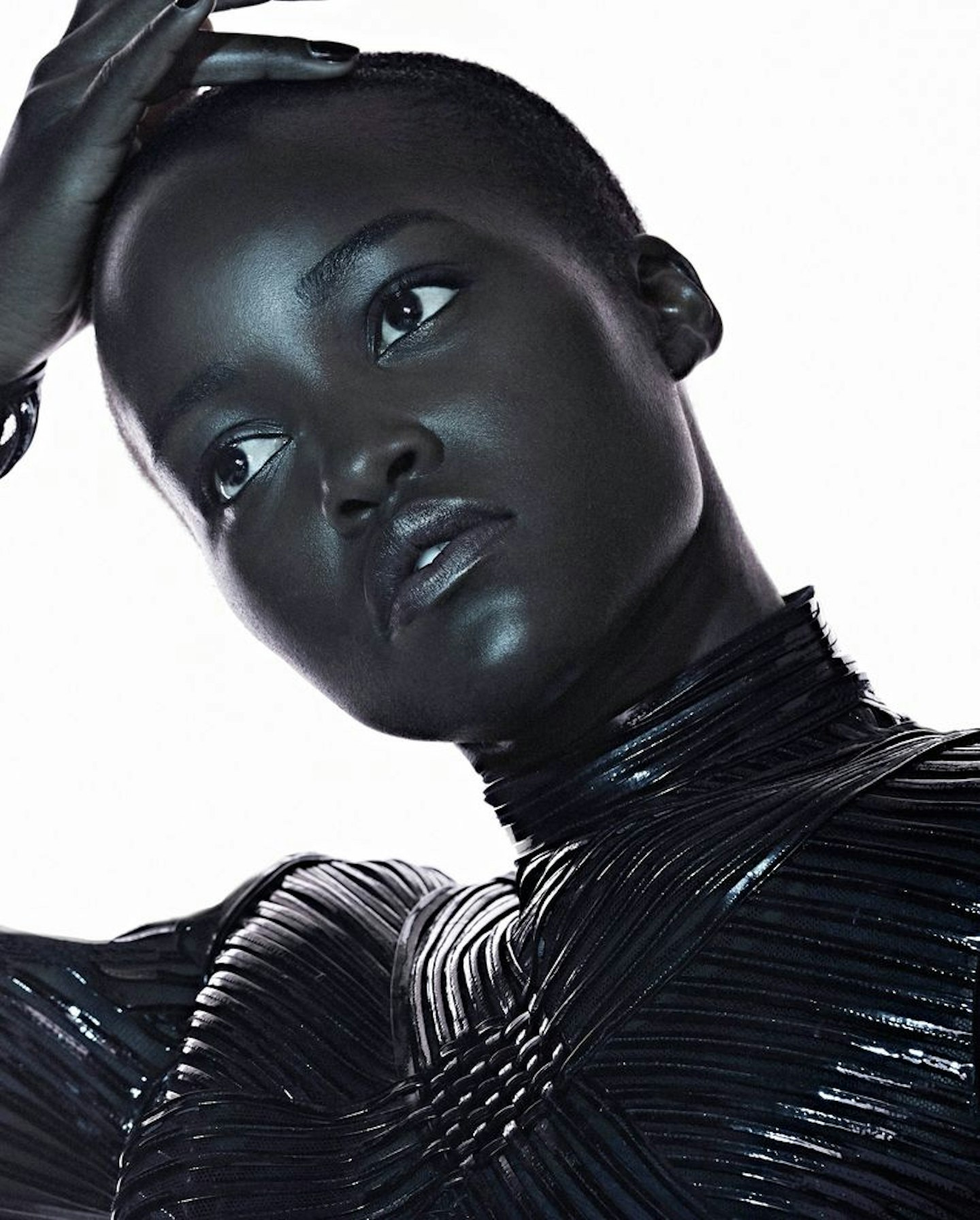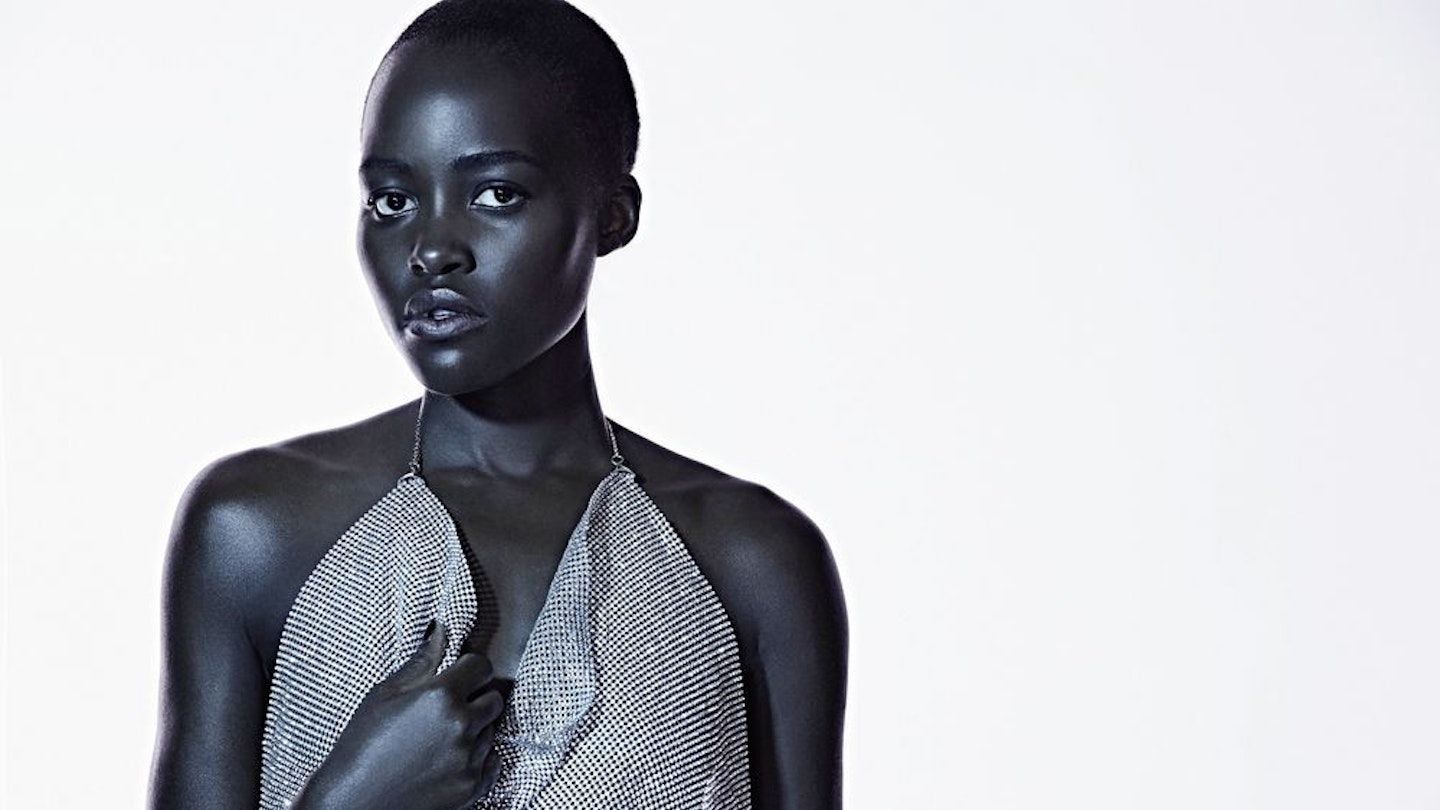‘It has been discombobulating. Scary. Unfamiliar. But I also feel invigorated. I think a lot of people who were complacent are waking up and paying attention.’ The Oscar-winning actress Lupita Nyong’o is describing the conflicting, complicated feelings she has about living in the United States, her home since 2012, under Donald Trump’s presidency. ‘I still feel like a visitor, and my family is far away,’ continues the 34-year-old, who was born in Mexico and raised in Kenya, where her father, Peter, serves in the Kenyan Senate, and her mother, Dorothy, is the managing director of the Africa Cancer Foundation. ‘But my mother always encourages me to plant roots and get involved. She says, “Make wherever you go home for now”. So I’m trying to be more of a Brooklynite.’
To say Lupita has made a splash in her adopted country would be a vast understatement. She’s one of only a few black women to have won an Oscar, for her haunting performance in 12 Years A Slave, and her red carpet style (‘I’ve never really followed fashion or trends’) has garnered her the adulation of the fashion world. Her presence, not just as part of Hollywood’s elite but at the top of best-dressed lists, has broken boundaries and helped inspire genuine change in the beauty industry.
She’s also made history as the first black actress to be given an ambassadorship for Lancôme. She once said she was ‘teased and taunted about my night-shaded skin’ as an adolescent, and prayed to wake up lighter-skinned. As the face of the cosmetic giant’s new Teint Idole Ultra Wear Foundation Sticks and Camouflage Concealer, she’s the role model she once longed to see. In other words, a genuine game-changer.
It’s a Friday morning at the beginning of New York Fashion Week, and we’re in an expansive studio in her adopted borough of Brooklyn. It’s a treasure trove of colourful kitsch, including a 10ft green plastic horse, a menagerie of taxidermy, and myriad antlers, skulls and mirrors. A small army of make-up artists, photographers and stylists scurry among the atmospheric bric-a-brac but, in a makeshift dressing room in one corner, Lupita is the epitome of calm self-possession. Her pre-shoot robe and slippers are both fluffy – she is quite the opposite: poised, focused, thoughtful.
The days when she wished she could change how she looked are long gone. Her motto is, ‘There’s room in this world for beauty to be diverse.’ She reveals that her mother always tried to instil this in her. ‘My mother – who has never worn make-up herself – didn’t allow me to wear make-up growing up. She always said, “Your skin is beautiful the way it is.”’
Now, she uses make-up to celebrate her skin tone, rather than to hide it. ‘For me, make-up is not a necessity. Make-up is not a mask, it’s an adornment, an accessory.’
For so long, women of colour found it impossible to find cosmetics to enhance their skin tones, but that’s changing. It was while promoting 12 Years A Slave – her first film, in 2013 – that she began to understand the power of good make-up. ‘For dark skin, the idea of blush is quite a foreign one,’ she says. ‘Then my make-up artist used a Lancôme blush, and it was the first time that I understood what blush can do for dark skin.’ But, as she recently observed, ‘Even during my time with Lancôme, they have expanded their range of skin tones. I remember a time in my teens when it was impossible to find my colour of foundation. When I began going on red carpets, we used to have to mix diferent colours to get the right one for my tone. I don’t have to do that any more, which is a sign of progress.’

Now, she ‘owns more make-up than I ever even imagined I would’, she laughs. ‘I love eyebrow definition, so a good eyebrow liner is essential, and an eyeliner, usually a pencil. And a bright blush really warms up my cheeks.’ But her most essential product is nail polish. ‘It’s an addiction. I’d give away a handbag before I’d give away a nail polish,’ she says, without a hint of hyperbole. Since bursting on to our red carpets in 2013, her style has been – like many other A-listers – scrutinised (and subsequently lauded). But she is adamant that she has never ‘followed fashion or trends’. ‘Growing up, it was a lot cheaper to make your own clothes than to buy them, so my mother would have our outfits made. Then, I started to do it myself – I would look through catalogues, and draw the things I wanted. I just loved doing my own thing.’ She even designed her own high-school prom dress. Now a bonafide A-lister, she works with uber-stylist Micaela Erlanger. ‘My first fitting was nerve-racking, because I’d never done anything like that before. And I’d never had to try and articulate my style to anyone, as I’d only ever dressed myself.’
She caught the acting bug early, at five years old. In spite of having supportive parents, attending an international school that fostered extracurricular drama, and joining a local repertory company, ‘I just didn’t think it was an option for me as a career,’ she shrugs. ‘We didn’t have much of a film industry in Kenya, and I didn’t know anyone who was acting for a living. I could dream about it, but I didn’t know how to make it a reality.’
Instead, she studied film and theatre studies at Hampshire College in Massachusetts, and, after graduation, worked on films as a runner including The Constant Gardener, where watching Ralph Fiennes inspired her to give her true ambition a try. She enrolled in a master’s degree at the prestigious Yale School of Drama, and had not yet graduated when she was offered the role in 12 Years A Slave by director Steve McQueen.
The film’s success catapulted her from unknown actress to Oscar nominee overnight, throwing her into the whirlwind of the awards campaign, a six-month round of non-stop public appearances, demanding appropriate outfits to match. ‘I was completely overwhelmed,’ she says, simply. ‘The body registers stress, whether good or bad, in the same way. So if it’s super exciting or super traumatising, your body is in equal distress. Though I would choose excitement over trauma every day.’
Lupita is fully aware of her tremendous good fortune in winning such a high-profile role so early in her career. ‘With the success of my first film and the accolades that came with it, I have the privilege of choice,’ she says. ‘I’m an ambassador for a beauty brand [and the face of Tiffany & Co] which gives me financial security, and I’ve been able to only say yes to things that I am actually deeply interested in.’ These include joining the biggest franchise in the business, playing the smuggler Maz Kanata in Star Wars: The Force Awakens, and playing an undercover spy in the adaptation of the Marvel comic book The Black Panther.
Her position has also given her a platform to speak out about the subjects she’s passionate about. She strives to tell the stories about Africa that were missing from her own childhood, including Eclipsed, the first play with an all-black female cast and creative team to premiere on Broadway. She was nominated for a Tony award for the play, about Liberia’s second civil war. ‘I know being an African woman on a Hollywood platform is not something you see every day, and I feel how special that is and I respect it,’ she has said.
Last month, she also wrote a widely praised op-ed for The New York Times about her harassment by Harvey Weinstein, which began while she was still a student, in which she said she was speaking up ‘to make certain that this is not the kind of misconduct that deserves a second chance’.
In 2014, a photo of Rihanna and Lupita at a Miu Miu show inspired one Twitter wag to comment: ‘Rihanna looks like she scams rich white men, and Lupita is the computer smart best friend that helps plan the scams.’ The idea led to real discussions between the pair, and the director Ava DuVernay, about a heist film for Netflix. ‘Everybody’s so excited about that,’ she smiles. DuVernay has been vocal in pushing for inclusivity in an industry which has been heavily criticised for its lack of representation. And Lupita believes the problem is not with the whiteness of the actors nominated for awards. ‘That is a result of a whole lot of systemic inequalities. It’s about actually putting your money where your mouth is and changing the demographics of the people making movies,’ she says. ‘If the people behind the cameras, the people writing the scripts, are diverse, then the things that happen in front of the camera will be more representative of the world we live in.
‘It’s too soon to pat ourselves on the back,’ she muses. ‘But as David Oyelowo says: “It’s not about a moment, it’s about momentum.”’
Photographs by An Le
READ MORE: With It's 2018 Calendar, Pirelli Has Officially Left The Past Behind
